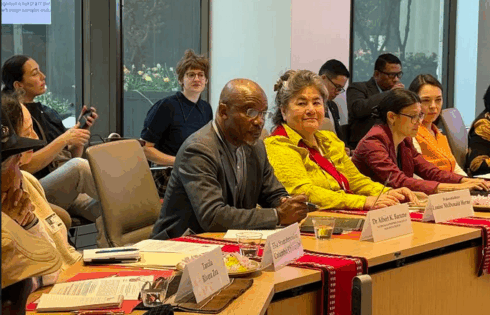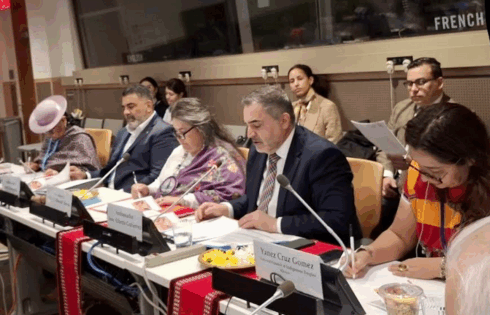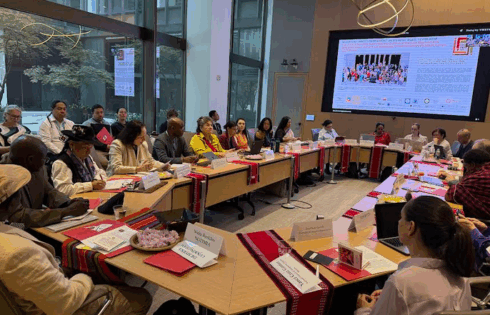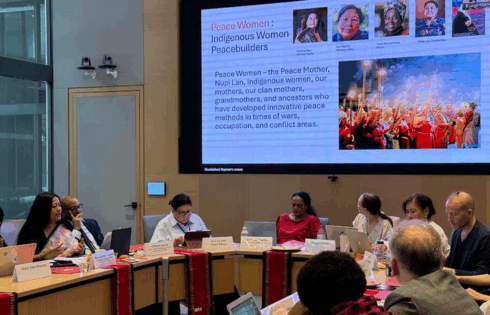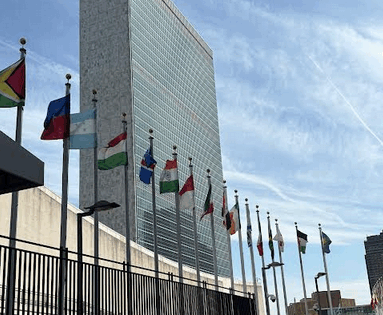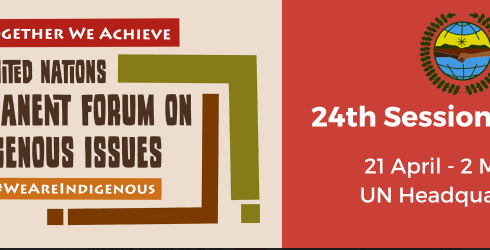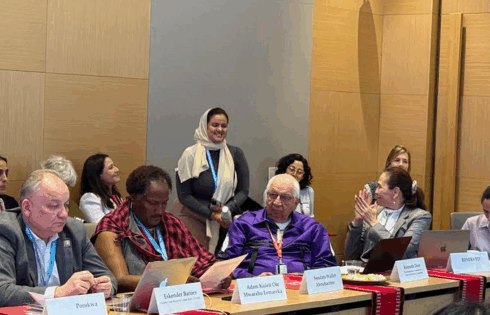United Nations, New York — Indigenous leaders, peacebuilders, UN, nations and allies from around the world gathered on April 24 and 25, 2025, during two pivotal side events at the United Nations Permanent Forum on Indigenous Issues (UNPFII) to advance Indigenous-led peacebuilding efforts globally. The two events — “Indigenous Peacebuilding: Pathways towards Healing People, for Peace and Planet” and “Global Strategy Meeting for International Decade of Indigenous Humanitarian Peacebuilding 2025-2035” — resulted in landmark decisions and declarations that will guide Indigenous peace work for generations to end wars and conflicts globally. Currently 107 wars are raging in the world displacing 200 million people globally and 80 percent of the conflicts are happening in biodiversity regions of world where Indigenous Peoples live. Key outcomes of the landmark events included:
- Recognizing the landmark UN General Assembly Resolution A/79/455 recognizing the role of Indigenous Peoples in conflict prevention, resolution, and sustaining peace. This resolution marks a first step toward integrating Indigenous knowledge, traditions, and governance systems into global peacebuilding frameworks.
- A Call for a Secretary General’s Report and call for a United Nations Decade on Indigenous Peacebuilding (2026–2035) to recognize and support the vital role of Indigenous Peoples in conflict resolution and reconciliation processes.
- Launch of the International Declaration on Indigenous Peacebuilding:
The Declaration outlines fundamental principles and strategies rooted in Indigenous knowledge systems, emphasizing historical knowledge, cultural, traditional mediation practices practiced by Indigenous Peoples globally. - Recognition of Indigenous Peace Women and Peace Mothers:
For the first time at the UN, call to recognize Indigenous Peace Women and Peace Mothers for their critical contributions to conflict prevention, community mediation, and healing processes, acknowledging their leadership in restoring and sustaining peace. - Highlighting the link between conflict, environmental violence and biodiversity:
Participants stressed that over 80 percent of today’s global conflicts are occurring in biodiversity-rich regions where Indigenous Peoples live, underscoring that Indigenous peacebuilding is essential for protecting both human rights and the health of the planet. - Call for recognizing conflicts in Indigenous territories and Indigenous Peacebuilding as a key international peace and security issue.
The UN General Assembly Resolution is built on the UN Declaration on the Rights of Indigenous Peoples (UNDRIP), adopted in 2007. UNDRIP calls that the resolution of conflicts and disputes involving Indigenous Peoples should consider Indigenous Peoples’ traditions and legal systems. The work on UNGA Resolution is also equally built on work of many including the historic First Global Summit on Indigenous Peacebuilding was held on 11 & 12 April 2024 in Washington DC where 120 Indigenous leaders, elders, women and youth gathered from 30 countries belonging to seven socio-cultural regions of the world. Following the historic Summit, and International Declaration on Indigenous Peacebuilding was adopted and signed and led to the formation of the Global Network of Indigenous Peacebuilders, Mediators and Negotiators.
Opening prayers and remarks on both days of the event was done by Wakerahkáhtste Louise McDonald Herne, Bear Clan Mother, Mohawk Nation Council. In the words of Binalakshmi Nepram,Founder-Director of Manipur Women Gun Survivors Network who along with many are working on the Indigenous Peacebuilding leaders, elders, women and youth stated, “With hundreds of conflicts happening in the world today in bio-diversity regions where Indigenous Peoples live, our collective work on Indigenous Peacebuilding is pivotal for ensuring peace, healing and planetary health.Violence in our lands is unacceptable and the wars must end.’
Dr. Albert Barume, the UN Special Rapporteur on Indigenous Rights also highlighted that peace and international security are deeply linked to Indigenous rights and Indigenous peoples are oftendeniedaccess to their rights, wrongly labeled as extremists by states and excluded from security discussions.He also emphasized that recognizing self-determination, land ownership, and cultural rights would strengthen international peace and security and reiteratedthatitis important to bring the matter to the Security Council.
Ambassador Jose Alberto Briz Gutierrez from Guatemala Mission to the UN formally launched the booklet, International Declaration on Indigenous Peacebuilding, calling it a “very special occasion” for Indigenous Peoples globally. He emphasized the triple planetary crisis of climate, biodiversity and pollution and underline show Indigenous practices are essential to solutions. He shared examples of Guatemala’s peace process that showed the critical role of Indigenou sPeoples in building inclusive democracies.
Ambassador Justin Mohamed from Australiain his remarks said that Indigenous Australians were the region’s first diplomats and peacebuildersand called for integrating Indigenous governance and conflict resolution practices intoformal frameworks.
Ambassador Graciela Gómez, Mexican Ministry of Foreign Affairs also spoke about the creation of the Women Peacebuilders Network and development of local-level mediation and collective conflict resolution frameworks, justice initiatives to build sustainable peace. She also spoke about women’s peace networks that will serve as the foundation for the development of the Weavers of the Nation Strategy (Tejedoras de la Patria) to ensure access to well-being and the full exercise of the rights of Indigenous women.
Awa Dabo from the UN Department of Political and Peacebuilding Affairs spoke about how the UNResolution A/79/455 marks a pivotal shift recognizing IndigenousPeoples as agents of peace and she emphasized that empowering Indigenous women and youth in peace processes presents a critical opportunity for change.
Tarcila Rivera Zea from Chirapaq, Peru in her statement insisted that peace must include a spiritual, territorial, and bodily dimension, particularly for Indigenous women and shared personal reflections on how decades of internal conflict have shaped Indigenous women’s movements in Peru.
Prof. Elsa Stamatopoulou from Colombia University stressed that Indigenous participation rights are critical for peacebuilding and called for Indigenouspeacebuilders, particularly women and youth, to be included in all relevant UN forums like the Permanent Forum on Indigenous Issues. Elsa also advocated for a Programme of Action to prepare a strategic Indigenouspeacebuilding plan before states act.
Kenneth Deer from Mohawk Nation shared teachings from the Great Law of Peace and spoke about diplomacy through good words, consensus-building, and rational dialogue.He emphasized non-violence, patience, and the central role of women in restoring peace and governance.
Several eminent speakers also attended from conflict zones around the world from Mali, Sahel Region, Nuba Mountains, Sudan, Congo, Tanzania. Bolivia, Mexico, Papua New Guinea, USA, Philippines, Chittagong Hill Tracts, Siberia, Geneva, Kiev, Peru, Canada, Kenya and many other regions.
Strategic Outcomes and Recommendations
- Call for the declaration of International Decade of Indigenous Peacebuilding, with a formal request to be submitted to the UN Secretary-General on 21 September, Peace Day
- Prepare a Programme of Action to be led by IndigenousPeacebuilders.
- Advocate for UN bodies and member states inclusion of Indigenous Peacebuilding into security and peacebuilding frameworks.
- Develop a curriculum on Indigeneous Peacebuilding and an online course.
- Strengthen the Network of Indigenous peacebuilders, Mediators and Negotiators.
- Indigeneous women participation in peace talks, mediation and negotiations
- Resource generation for Indigenous Peacebuilding work.
- Préparation for the hosting of the Second Global Summit on Indigeneous Peacebuilding in April 2026 in between two weeks of UN Permanent Forum.
- Centre survivors at the heart of Indigenous Humanitarian Peacebuilding efforts for ensuring their dignity, peace and security.
For further inquiries please reach out to: Global Network of Indigenous Peacebuilders, Mediators and Negotiators, Bina Nepram Binalakshmi@gmail.com

